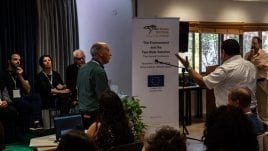
David Lehrer
Executive Director
* Track II (citizen) diplomacy is a process usually facilitated by non-governmental actors. Track Two Diplomacy is an “unofficial, informal interaction between members of adversary groups or nations that aim to develop strategies, to influence public opinion, organize human and material resources in ways that might help resolve their conflict.” (JV Montville, 1991)
Track I diplomacy is a government facilitated process.

